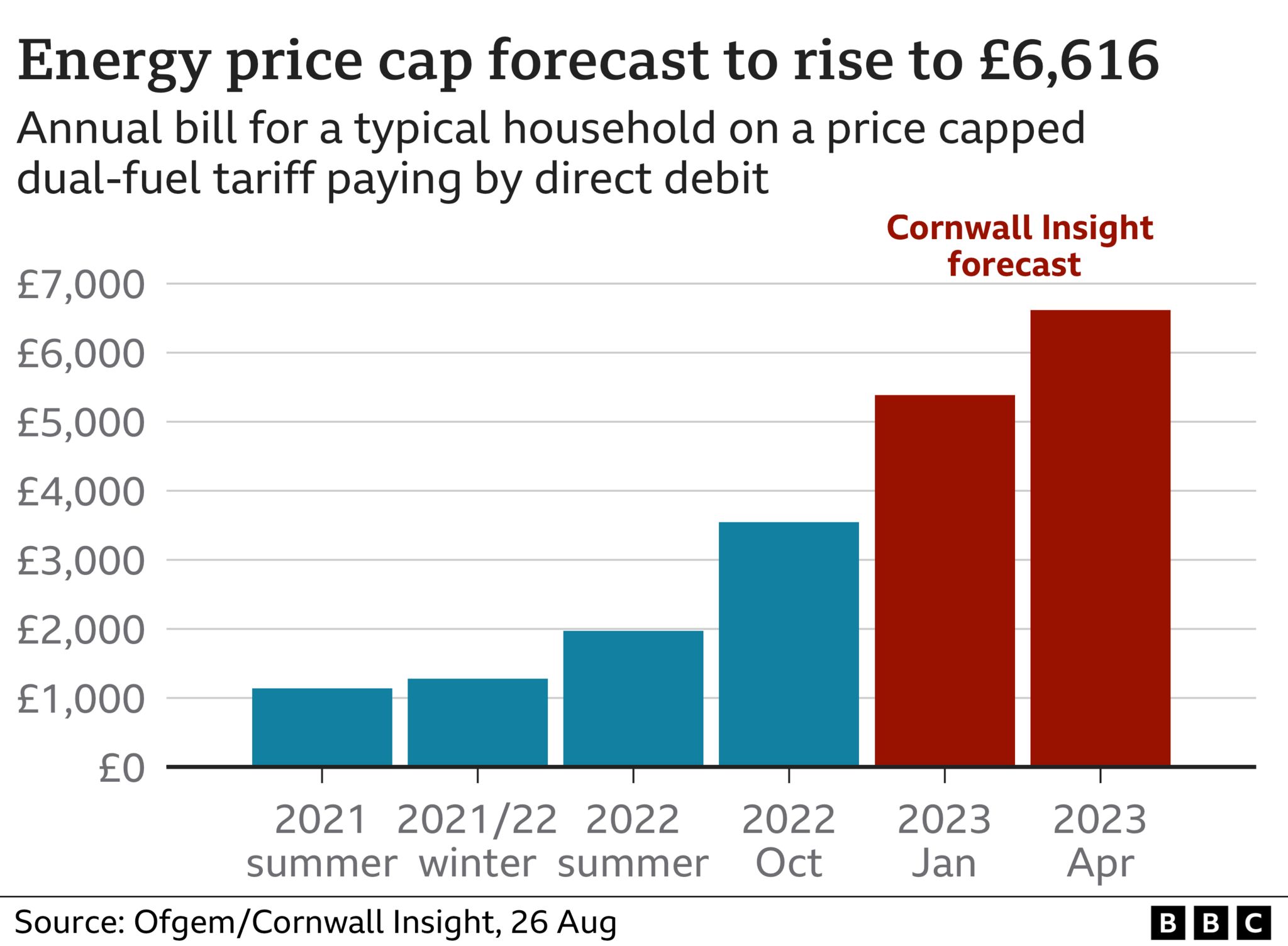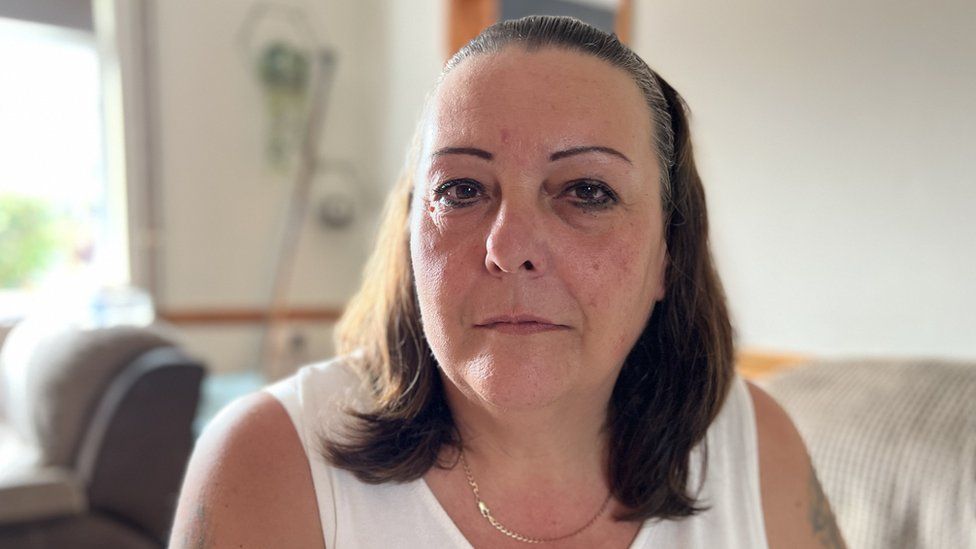The typical household energy bill will hit £3,549, prompting concern for people’s health this winter.
This video can not be played
To play this video you need to enable JavaScript in your browser.
Lives will be at risk this winter, experts and charities have warned, unless the government does more to help people with soaring energy bills.
Households are facing a jump in energy prices from October when the typical bill will rise to £3,549 a year.
Save the Children said young people’s health was at risk, while money expert Martin Lewis predicted grave consequences without more support.
Pressure is growing on Liz Truss and Rishi Sunak to outline further help.
The two Conservative Party leadership candidates have both pledged more direct support for households struggling with surging gas and electricity bills.
But neither have given detail on what they will do ahead of a new party leader – and prime minister – being announced on 5 September.
Labour have accused the candidates of having “almost nothing to say” about the huge spike in energy costs.
Chancellor Nadhim Zahawi said “we know we need to do more”, adding that “more help is on its way”. He also suggested that people should cut down on how much energy they use.
“The reality is that we should all look at our energy consumption. It is a difficult time. There is war on our continent,” he said.
On Friday, energy regulator Ofgem announced that the energy price cap will rise by 80% from 1 October.
Mr Lewis, a personal finance journalist and campaigner, warned that without extra support, some people will face health problems because they couldn’t afford to heat their homes.
“I am begging and praying and pleading that there is more government help this winter so that people do not die,” he said.
Meanwhile Save the Children’s head of child poverty Becca Lyon said: “Children are at serious risk from today’s announcement and could spend this winter in cold homes.
Katie Schmuecker, principal policy adviser for the Joseph Rowntree Foundation a charity which focuses on poverty, said: “It is simply unthinkable that the price rises announced today can go ahead without further government intervention on a significant scale.”
How much are prices rising?
- The price cap, set by the regulator, Ofgem, is rising by 80% in October
- The price of electricity will rise on average from 28p per kilowatt hour (kWh) to 52p and gas will go up from 7p to 15p per kWh
- A typical annual energy bill paid by direct debit is currently £1,971. In October, that will rise to £3,549
- Prepayment meter customers will pay an extra £59 a year from October, taking the new typical bill on a prepayment meter to £3,608
The government announced in the spring that all households will get a £400 rebate on energy bills. It means £60 will be knocked off energy bills every month for six months. Low income and vulnerable households will receive an additional £650.
However, energy prices have since soared and from October a typical household will see monthly energy bills of nearly £300 a month.
Analysts at Cornwall Insight have predicted the price cap will climb even more resulting in a typical annual household bill of £5,400 in January before hitting more than £6,600 in April.

Jonathan Brearley, chief executive of Ofgem said that the predictions should be treated with caution as the current global volatility could “change massively” but he agreed that the next prime minister needed to “act urgently and decisively to address this”.
He told the BBC: “All of us, with the government, need to get ahead of this problem and manage it on behalf of customers because the outlook for winter without any action looks very difficult indeed.”
Labour and the Lib Dems criticised the government for failing to respond to the growing crisis.
LibDem leader Ed Davey said the energy price rise was “nothing short of a catastrophe for millions of families and pensioners”.
Shadow chancellor Rachel Reeves said the announcement would “strike fear in the heart of many families, and force many to make unthinkable choices this winter.”
The rise in consumers’ bills follows sharp rises in wholesale largely due to the conflict in Ukraine which has reduced supplies of Russian gas.
Businesses are not covered by a price cap and many face cost pressures that could be passed on to consumers in higher prices.
Prices have also been rising in Northern Ireland, where there is no cap owing to the limited number of suppliers.

The new energy price cap will drain the disposable income of several million households.
And it is not just an issue which will transform the path of the economy. These rises are so large and so widespread that they could test the nation’s social resilience too.
Even the energy industry itself doesn’t think these rises are possible.
At a recent meeting with the government to discuss the Energy Tariff Deficit Fund, a key takeaway was that not one energy firm believed that it is feasible to charge the nation what the companies themselves are having to pay to purchase gas.
That is an amazing and remarkable situation.
So that gaping hole, that is getting larger every day, week and month is now in the hands of the government.

‘I’m living on nothing’
Among those already struggling with their finances is Marina Keohane, from Gainsborough in Ipswich, who said the thought of higher fuel bills this winter brings tears to her eyes.
“To actually fear every day how you’re meant to live, that’s just something else. I’m living on nothing,” she said.

“I don’t use anything, the only thing that’s on all the time is the fridge freezer. I have a TV on, I don’t have the light on – I sit in darkness.
“Eating wise, I’m scared to use my cooker. It’s electric and obviously if you put something in the oven it uses more [energy] so I try to stick to ready meals in the microwave or do salads.”
- Read more of Marina’s story – part of the BBC News Counting the Cost of Living series


How will you be affected by the energy price cap rise? What are your questions? Email: haveyoursay@bbc.co.uk.
Please include a contact number if you are willing to speak to a BBC journalist. You can also get in touch in the following ways:
- WhatsApp: +44 7756 165803
- Tweet: @BBC_HaveYourSay
- Or fill out the form below
- Please read our terms & conditions and privacy policy
If you are reading this page and can’t see the form you will need to visit the mobile version of the BBC website to submit your question or comment or you can email us at HaveYourSay@bbc.co.uk. Please include your name, age and location with any submission.